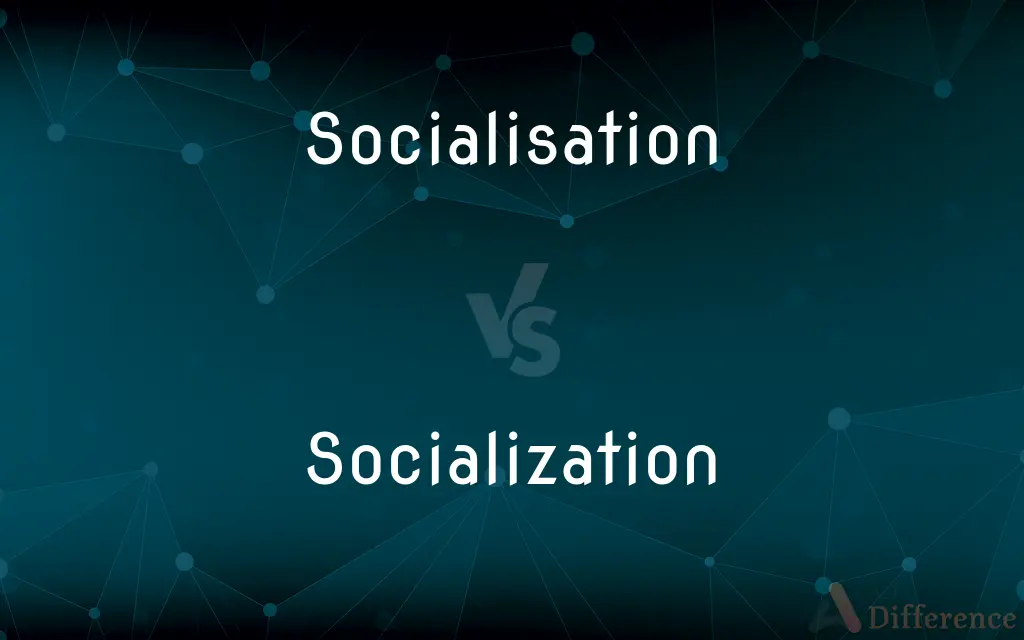Socialisation vs. Socialization — What's the Difference?
By Fiza Rafique & Urooj Arif — Updated on March 10, 2024
Socialisation and socialization are two spellings of the same concept, referring to the process by which individuals learn and internalize the norms, values, and behaviors of their society.

Difference Between Socialisation and Socialization
Table of Contents
ADVERTISEMENT
Key Differences
Socialisation, as spelled in British English, encompasses the lifelong process through which people acquire the cultural norms and values of their society. It includes learning language, customs, and behaviors that are deemed appropriate. On the other hand, socialization, the American English spelling, refers to the same comprehensive process of inheriting and disseminating norms, customs, and ideologies. It provides individuals with the skills and habits necessary for participating within their own society.
Both terms underscore the importance of various agents of socialisation/socialization, such as family, education systems, peer groups, and media, in influencing an individual's development and integration into society. While the spelling varies, the role of these agents remains consistently recognized across both British and American English contexts.
The process of socialisation/socialization is critical in shaping an individual's identity, beliefs, and practices. It not only helps in understanding societal expectations but also in developing personal and social identity. Whether spelled with an "s" or a "z," the concept points to the way individuals come to understand societal norms and find their place within the cultural and social frameworks.
In discussing the outcomes of socialisation/socialization, it is evident that both terms refer to the end goal of creating well-adjusted individuals who can function effectively within their society. This involves adopting societal norms, values, and roles that enable individuals to contribute positively to their community and social environment.
Despite the spelling difference, socialisation and socialization are integral to discussions in sociology, psychology, and education, highlighting the universal nature of this process across cultures and societies. The choice of spelling merely reflects regional language conventions without altering the concept's fundamental significance or the intricacies of how individuals learn to navigate their social worlds.
ADVERTISEMENT
Comparison Chart
Spelling
Uses "s" in "isation."
Uses "z" in "ization."
Usage
Preferred in British English contexts.
Preferred in American English contexts.
Concept
The process by which people learn the norms of their society.
The process by which people learn the norms of their society.
Agents
Family, schools, peer groups, media.
Family, schools, peer groups, media.
Focus
Cultural norms, values, behavior acquisition.
Cultural norms, values, behavior acquisition.
Outcome
Well-adjusted individuals to society.
Well-adjusted individuals to society.
Academic Fields
Sociology, psychology, education.
Sociology, psychology, education.
Compare with Definitions
Socialisation
The process by which individuals learn their culture's norms and values.
Through socialisation, children learn to speak their native language.
Socialization
The lifelong process of inheriting and disseminating norms and customs.
Socialization is crucial for the development of social skills.
Socialisation
The influence of family, education, and peers in developing social norms.
Family is the first agent of socialisation.
Socialization
Facilitated by institutions like families, schools, and media.
Media is a powerful agent of socialization in contemporary society.
Socialisation
Involves integration into society through learning roles and behaviors.
School plays a key role in the socialisation of young people.
Socialization
Includes the acquisition of language, norms, and cultural values.
Peer groups significantly influence the socialization of adolescents.
Socialisation
Essential for understanding societal expectations and functioning within them.
Socialisation helps individuals navigate complex social interactions.
Socialization
Affects an individual's identity, perceptions, and interactions.
Professional socialization shapes one's work ethic and professional identity.
Socialisation
Alternative spelling of socialization
Socialization
Critical for successful integration into and contribution to society.
Effective socialization enables individuals to participate fully in social life.
Socialisation
The action of establishing on a socialist basis;
The socialization of medical services
Socialization
In sociology, socialization is the process of internalizing the norms and ideologies of society. Socialization encompasses both learning and teaching and is thus "the means by which social and cultural continuity are attained".Socialization is strongly connected to developmental psychology.
Socialisation
The act of meeting for social purposes;
There was too much socialization with the enlisted men
Socialization
To place under government or group ownership or control
Socialized medical care.
Socialisation
The adoption of the behavior patterns of the surrounding culture;
The socialization of children to the norms of their culture
Socialization
To cause to accept or behave in accordance with social norms or expectations
Techniques to socialize aggressive children.
Socialization
To take part in social activities
Likes to socialize with people her age.
Socialization
The process of learning how to live in a way acceptable to one's own society, said especially about children.
Socialization skills are important things to learn in kindergarten.
Socialization
The act of interacting with others, of being social.
Forced socialization rarely creates strong friendships, but there are exceptions.
Socialization
Taking under government control as implementing socialism.
Socialization
The action of establishing on a socialist basis;
The socialization of medical services
Socialization
The act of meeting for social purposes;
There was too much socialization with the enlisted men
Socialization
The adoption of the behavior patterns of the surrounding culture;
The socialization of children to the norms of their culture
Common Curiosities
Are socialisation and socialization the same thing?
Yes, they are the same concept spelled differently in British English ("socialisation") and American English ("socialization").
Why are there two spellings for socialisation/socialization?
The difference in spelling reflects the standard conventions of British and American English, similar to other words like "realise" and "realize."
How does socialisation/socialization impact an individual?
It impacts by shaping their beliefs, behaviors, identity, and the way they interact with others within their society.
What is socialisation/socialization?
It's the process through which individuals learn and internalize their society's norms, values, and behaviors, enabling them to function within their cultural and social frameworks.
How do cultural differences affect socialisation/socialization?
Cultural differences lead to variations in the values, behaviors, and social norms that individuals are taught to navigate, reflecting the diversity of societal expectations worldwide.
Is socialisation/socialization a lifelong process?
Yes, it continues throughout an individual's life as they encounter new social contexts and roles.
Is socialisation/socialization only relevant to children and adolescents?
No, while it's especially crucial during early development, socialisation/socialization occurs throughout life as individuals adapt to new social roles and environments.
Can the process of socialisation/socialization vary between cultures?
While the process is universal, the specific norms, values, and behaviors learned can vary significantly between different cultures and societies.
What role do schools play in socialisation/socialization?
Schools are critical in teaching societal norms, facilitating social interactions, and preparing individuals for their future roles in society.
What are the agents of socialisation/socialization?
Key agents include family, educational institutions, peer groups, and media, each playing a crucial role in the process.
Why is socialisation/socialization important?
It's essential for the survival and functioning of societies, as it ensures that members understand and adhere to the social norms that allow for cooperation and social harmony.
How does peer group influence differ from family influence in socialisation/socialization?
Peer group influence typically becomes more significant during adolescence, focusing on social skills and identity outside the family context, whereas family influence is foundational, impacting early value and norm development.
What are some outcomes of successful socialisation/socialization?
Outcomes include the development of a social identity, the ability to function effectively within society, and the capacity to maintain and contribute to the culture's continuity and coherence.
Can socialisation/socialization processes change over time?
Yes, as societies evolve, the processes and content of socialisation/socialization adapt to reflect new norms, values, and technologies.
Share Your Discovery

Previous Comparison
Mutation vs. Polymorphism
Next Comparison
Condo vs. ApartmentAuthor Spotlight
Written by
Fiza RafiqueFiza Rafique is a skilled content writer at AskDifference.com, where she meticulously refines and enhances written pieces. Drawing from her vast editorial expertise, Fiza ensures clarity, accuracy, and precision in every article. Passionate about language, she continually seeks to elevate the quality of content for readers worldwide.
Co-written by
Urooj ArifUrooj is a skilled content writer at Ask Difference, known for her exceptional ability to simplify complex topics into engaging and informative content. With a passion for research and a flair for clear, concise writing, she consistently delivers articles that resonate with our diverse audience.














































